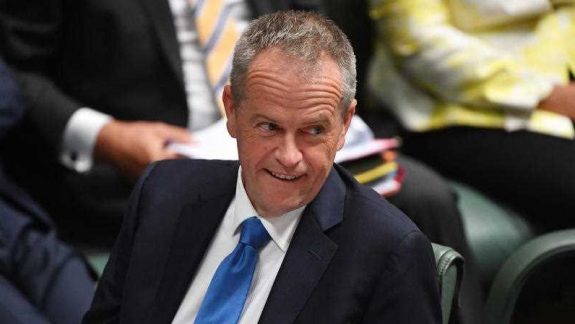Scrap the digital workhouse. An open letter to Tony Burke.

We know you are new in your job, Tony and face not only the huge demands of your portfolio but a backlog of catastrophic ineptitude and deceit left you by a Morrison government whose criminal negligence of health and welfare was rivalled only by its pandering to corporate oligarchs and its bent for wholesale corruption, but can you, please, reconsider Pbas?
Pbas is the points-based system that the Coalition was keen to inflict on job-seekers, a jobactive revamp it promoted as “more flexible” than mandatory job application. It’s not. It’s Liberal propaganda designed to pillory job seekers for being out of work. Lazy dole-bludgers. Political point-scoring. Baked into it is unconscionable, sadistic cruelty and victim-blaming. It’s the antithesis of everything we’ve come to associate with Labor.
Above all, Pbas won’t work. It’s too complex. It’s discriminatory and opaque. Users are at the mercy of a computer that decides if they’ve earned enough points. Of course, there are numbers to ring and visits you can make but have you ever tried to visit or ring Centrelink? Now Services Australia, another brave new oxymoron, says it is cutting work to outsourced call centres by thirty per cent. It’s as if they’ve set up the new system and Labor to fail. It’s a $7 billion dollar booby trap. You don’t want to crash and burn so soon after winning office.
Clients also are set up to fail. 200,000 people every month had payments suspended in Jobactive. Who knows how they met their rent or bought their groceries? ACOSS warns that Pbas will replicate this cruelty. It takes the Jobactive debacle and makes it worse.
It’s cruel. Pbas will make it harder for the poor and needy to get support, in the same ways that Morrison’s regime restricted access to the NDIS and individuals had their funding cut. Liberals love to scare us into believing that welfare is a crippling financial liability. Yet corporate welfare is vital. Billions are blown in subsidies to wealthy corporate donors. But look after the aged, the disabled, the poor and the needy? A burden we can’t afford. Nonsense. In fact, there are huge economic benefits in being a responsible government supporting and empowering all Australians. Take the NDIS as an example.
The economic benefit of the NDIS in 2020/21 was $52.4 billion, according to Per Capita. It adds economic activity worth $29 billion to $23.3 billion in NDIS spending. $2.25 was delivered to the economy for every dollar spent, it calculates. Conversely, there are huge costs beyond every pension dollar withheld. Consider the harm Pbas does to a jobseeker’s self-esteem. Bad enough you’re between jobs – or that you can’t get enough hours. Now you’re going to incur demerits as you lose points on Pbas.
Imagine the emotional labour and frustration of having to navigate a system so absurdly arbitrary and punitive that it is dubbed “Hunger Games meets Black Mirror”.
No wonder job seekers sampled recently used the word “suicidal” in their responses to how the new scheme could make them feel. Surely Labor could heed the warnings. No-one has forgotten or forgiven Robodebt. Do you really want to go down this path?
Not only will many be set up to fail the test, which favours the more literate job-seeker with resources such as access to a digital device, internet and time, but Pbas fails us as a compassionate, civil society. It fails Labor, too. If Labor still believes in a fair go. Has Labor done any research? Monash University’s David O’Halloran has conducted an online survey. His 447 job seekers were not only worried about getting a hundred points, a key feature of the system, they were afraid they’d be penalised, another design highlight.
Best heed the early warnings. Listen, as the PM promised he would listen to all Australians. Do you really want to continue the welfare terrorism of Coalition governments?
O’Halloran reckons, “ … harm was actually being designed into the system”.
In his view it’s “still based on the assumption, if you’re unemployed, you don’t want to work”.
I know, Labor supported Pbas in the last government. It’s tricky. Small target strategy can mean you snooker yourself. But you are the government. You can scrap it tomorrow. I’ve read your press releases. You’ve “tweaked it”, you say. But you can’t polish a turd. Pbas is hurtful. It’s been designed that way.
The same crew who brought us Robodebt. presents, Robo Task. Ta-Da. Starring a nifty computer algorithm to cut off your funds. Pbas is not a humane welfare system – but “… a digital workhouse set up to brutalise people in desperate economic need and push them out of the system and onto the street,” warns The Unemployed Workers Union. Bill Shorten uses the same image.
You’ll need to be computer-savvy, too. As ACOSS helpfully points out. “Your payment may be suspended if you do not complete the report for your points at the end of your reporting period. You will need to report these points to stop your payment from being suspended.” But let’s say you get your hundred points. How helpful is the site?
I just did a search on your new Jobactive 2.0 website. Guess what? As with everything else Morrison, it’s a dud. There’s not a single job in our regional town of around 9,000 people. Petrol is up to $2.20 a litre in town but there are a few jobs if you travel an hour each day. That’s just if you are lucky enough to get an interview. The bigger centres have plenty of locals on their books and an industry of job agencies. But PBAS is more than a website, of course, it’s a points system masquerading as self-help in that unctuous, patronising, condescending tone trademark of the Morrison horror-show.
Here’s a sample.
“Do you want to improve your English, reading and writing skills? Improving these skills could help you find a job or lead to other study or employment opportunities. The Skills for Education and Employment program is a free program that can provide you with training to improve your reading, writing, maths and digital skills.” Of course, it will. It will also improve the bottom line of the Pbas tutorial agencies that will pullulate, like mushrooms in the dark, all over the country, overnight.
“The SEE program will help you overcome obstacles and achieve your career goals. You’ll gain new skills and confidence and learn alongside others with similar experience. The training is flexible to suit you, so you can do full or part-time, in a classroom or at home. You can even gain a certificate-level qualification through the SEE program. To see if you can join, contact your Employment Services Provider or Centrelink.”
Life’s hard enough if you’re one of the 1,360,100, the ABS reckons are unemployed, underemployed or unlucky enough to be retired but too young to go on the pension. You must make do on a pittance that is below the poverty line.
There is a full-blown crisis affecting hundreds of thousands of Australians who face vegetable price rises of 27% annually, pro-rata over the first three months of this year. Basics such as baked beans and sausages are up 20%-30%.
The penurious amount paid to Centrelink pensioners is a national scandal that governments are able to ignore because they are marginalised and voiceless. Helping is a Murdoch-led media which is keen to scapegoat those out of work as bludgers. Yet steep rises in the cost of food, rent, power and fuel are turning crisis into catastrophe. You own five houses, Tony, You enjoy a high salary, generous allowances, a top superannuation scheme and you’ve just had a 2.75 per cent pay rise. Can you even begin to imagine what it’s like to have to get by on fifty-four dollars a day? (With rental assistance.)
We have a clear idea because our wonderful 37-year-old daughter has to do just that. Matilda’s degenerative bone disease means she’s in continuous pain. She’ll need two new hip replacements shortly. It’s seven months to see a pain specialist.
Centrelink puts hurdles in her way. Her pain can only get worse yet Matilda must continuously get certificates from a GP to be exempt from applying for jobs she’s got no show of ever getting, let alone doing and which are scarce enough in a regional town. Fifty-four dollars if you qualify for rent assistance looks pitiful against the $291 per day that you can claim for accommodation in Canberra. It’s more if you have to stay in other cities. Unlike your job, Tony, with your accommodation and your travel allowances, there’s no fringe benefits in Matilda’s job. Matilda doesn’t get enough hours at her workplace where she’s worked for seven years without sick leave or benefits because she’s a “permanent casual”, an oxymoronic term embracing up to a quarter of the workforce.
The way workplaces are run these days means that more and more Australians are working casual shifts. It saves the boss a fortune but work itself becomes ever more precarious. And stressful. Along with many other young workers with special needs, our daughter has difficulty coping with change. I’m our daughter’s nominee in dealing with Centrelink but there’s been no warning of the change. It starts July 1st. Granted, no-one will be penalised in the first month but it will take all of that to get over the shock of having the rules changed so suddenly and without any consultation, whatsoever, with prospective users. The PM promises a government that will listen. How hard would it be to consult those vulnerable men and women who must suffer your grand design? At $7 billion dollars, Pbas is an unwarranted extravagance for any government let alone a Labor government which has its origins in looking after workers and their families. It’s just another costly way to punish the 548,100 unemployed and the 821,000 the ABS tells us are underemployed. (It’s far more than these statistics show given the way data is collected.)
You are not unemployed for example if you live on a family farm or are part of a family business and do one hour’s work a week unpaid. You do not enter unemployment statistics if you have given up looking for work. Or if you have given up on the system altogether because it’s all too hard. Is that your aim, Tony? Save the welfare spend by getting the poor job-seeker to drop out? We hope not. But if you continue with Pbas that’s what will happen. Not to mention the confusion, suffering and distress you will inflict on some of our most vulnerable by proceeding with a points-based system that is unworkable, unfair and downright cruel.
A society can be judged on how it treats its most vulnerable members. So far, Labor is breaking its election promise to be a government for all Australians by proceeding with a job-seeker system that discriminates against the powerless, poor and marginalised worker who has too few hours or who, increasingly, may be unable to find work. Would the women and the young people who voted for you, have done so had they known you were simply going down the Morrison government’s road of punishing the poor and vulnerable? You say it’s too late to change. It’s not. You’re in government. You can halt Pbas immediately. Dismantle the digital workhouse. Jobseekers, the aged and the disabled don’t need more ways to make them feel they are a burden. Take the $37 billion you are going to give to the rich. Use it to help create fair and liveable pensions instead.
Like what we do at The AIMN?
You’ll like it even more knowing that your donation will help us to keep up the good fight.
Chuck in a few bucks and see just how far it goes!
Your contribution to help with the running costs of this site will be gratefully accepted.
You can donate through PayPal or credit card via the button below, or donate via bank transfer: BSB: 062500; A/c no: 10495969












